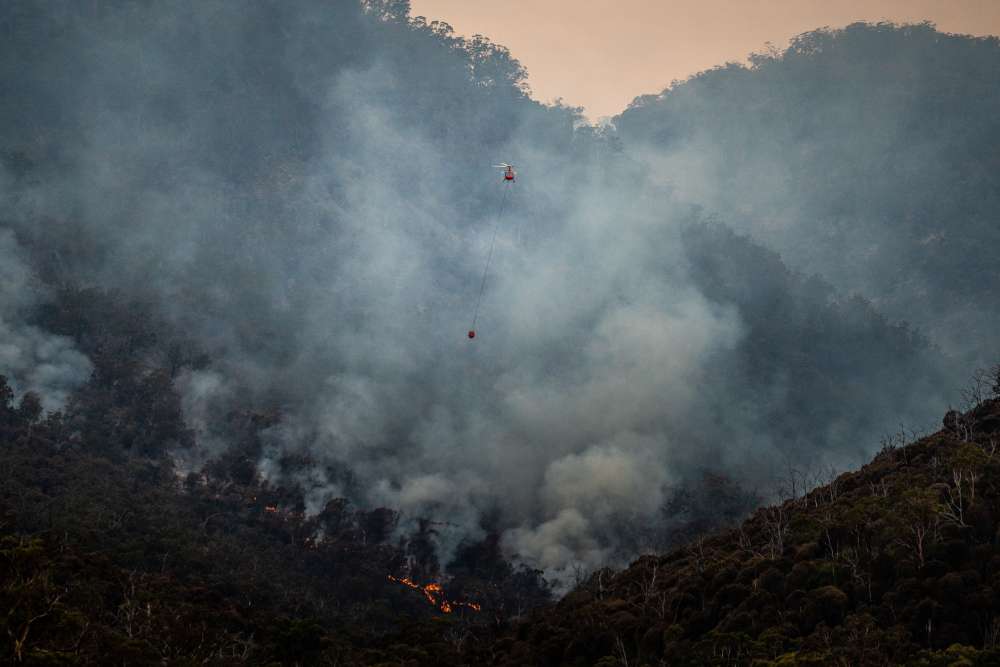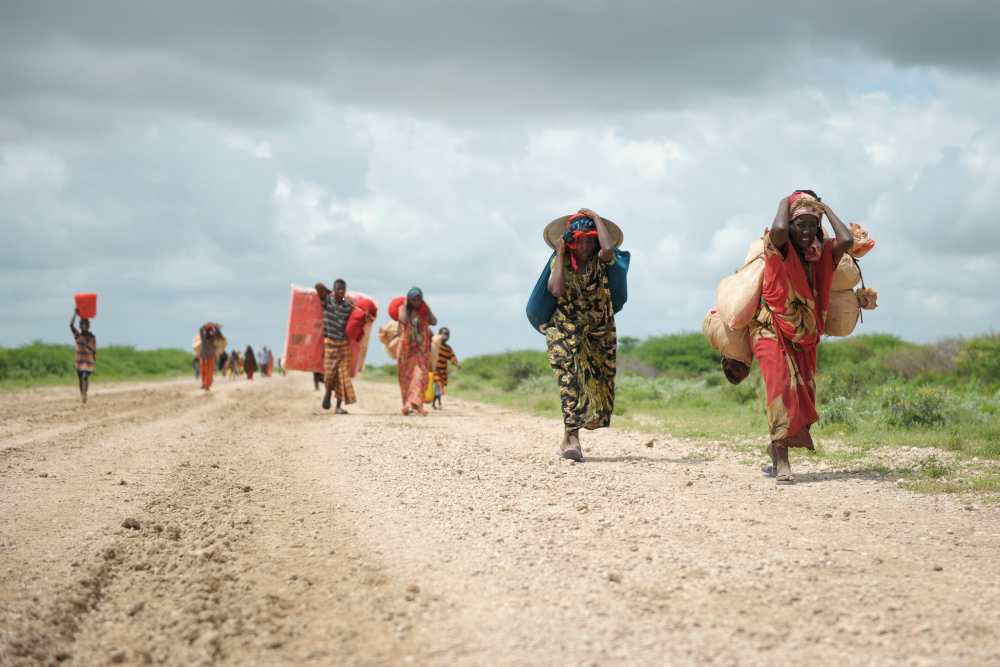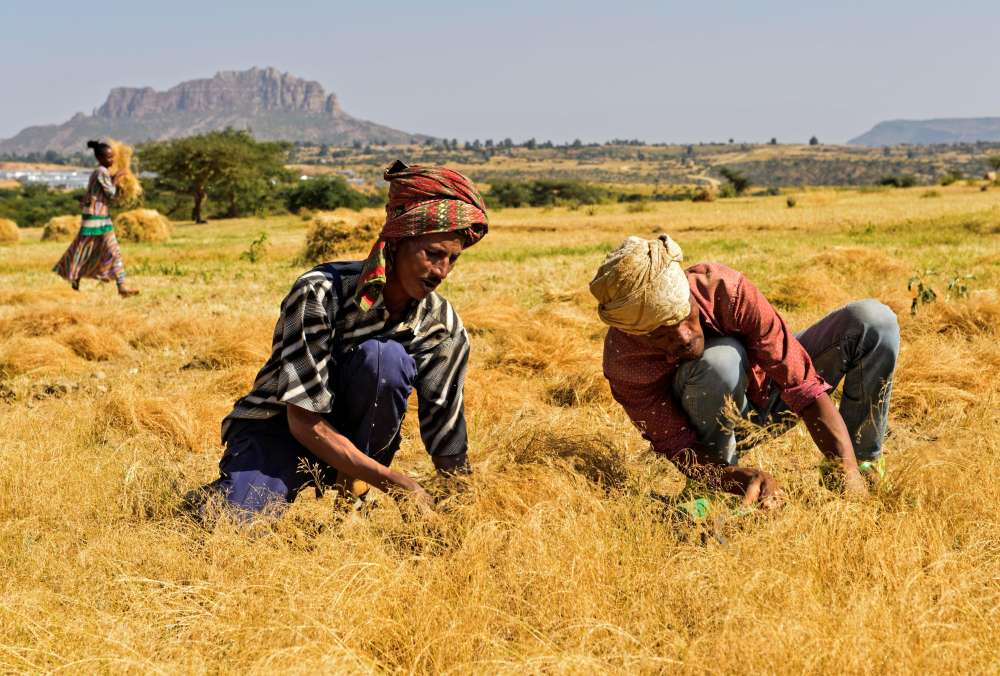Shock-Proofing Global Food Systems: A Pathway to Peace, Security and Prosperity
Efforts to enhance global food security are a remedy to several causes of global insecurity at once. Germany should invest in agricultural innovations that benefit small-scale farmers, starting with better support for neglected crops.
Teff is a cereal grain native to the Horn of Africa. It is also a food staple for the people of Ethiopia, Eritrea and parts of Somalia. Because it can adapt to the wide variety of marginal and semi-arid soils and elevations found in the country, teff accounts for roughly two-thirds of the protein that Ethiopians consume every year. It is among the most resilient cereals, tolerating growing conditions that are unsuitable for wheat, maize or rice production.
However, growing teff comes with its challenges too. The stalk is bendable and strong winds can flatten entire crops. The seeds are very small, making them difficult to harvest. If teff was an important dietary staple in wealthy world regions like Europe and North America, we would see countries like Germany devote sizable investments to crop research focused on improving the cereal, for instance by strengthening the stalk or increasing the size of the grains. Such research work could also contribute to food security in Africa. In reality, however, research funding goes elsewhere instead – a key reason why teff harvest yields are lower than those for other major cereal crops.
Ethiopian farmers who grow teff – and are already beset by an epic drought plaguing the region – lack the steady supply of ever-improving and ever more resilient seeds that maize and wheat farmers enjoy. When their farms do well, their families do well and hunger and poverty fall across communities. When their farms falter, though, hunger and poverty spike. With the entire Horn of Africa in drought, Ethiopia’s food security remains tenuous.
A Decade of Shocks for Food Systems
Food insecurity, first and foremost, creates conflict. A striking example was the so-called Arab Spring of 2011, the political upheaval that began in Tunisia and swept through the Middle East and North Africa over the course of the decade. Many of the authoritarian governments in the region faced unrest over economic conditions, but a regional drought that sent food prices soaring pushed people’s frustration over the edge. Since then, a series of climate-related shocks, armed conflicts and the effects of the COVID-19 pandemic have driven a steady rise in hunger and poverty.
Key Points:
- International investments in diversified and more resilient crops can support small-scale farmers in low- and middle-income countries in sub-Sahara Africa and mitigate global food shocks.
- More agricultural research is needed to help African farmers to adapt to adverse effects of climate change.
- Germany should continue encouraging other countries to frame investments aimed at shock-proofing the food system in the Global South as a global responsibility.
People in agriculture-dependent regions like Sub-Saharan Africa struggle more with these disruptions because most of them depend on small-scale farming for income. Their farms also supply most of the food sold in local markets. In Ethiopia, the years-long drought has been exacerbating regional conflicts, and food insecurity has lingered in many parts of the country. In fact, Ethiopia’s food crisis can be seen as a layering of conflicts: local causes are now intertwined with the global grain and fertilizer shortages caused by Russia’s invasion of Ukraine. The lagging productivity of staples like teff leaves Ethiopia more dependent on food imports and thus more vulnerable to the destabilizing effects of food shocks like those caused by Russia’s war.
But it is not just teff that is the issue. Globally, other food crops widely grown in Africa — including cassava, sorghum and yams — have received only a fraction of the investments made in improving the dietary staples of Europe and North America. This imbalance is problematic in its own right. Moreover, even though these crops are consumed mainly in the Global South, their failure sends negative ripple effects around the world. Ensuring their success should thus be seen as a global responsibility.
Needed: International Investments
Investments by international donors, including Germany, can support solutions for farmers across Africa that ultimately contribute not just to local or regional but also to global security. For example, as climate change raises temperatures, wheat crops will suffer more than relatively heat-tolerant grains like teff. If the latter’s stem can be strengthened and its yield improved, that can help address climate-related food shortages that will likely drive political unrest and conflict — challenges that will become even more severe unless African farmers can adapt to rapidly intensifying climate stress. Less conflict in the world ultimately improves national security, too.
» Investments by international donors can support solutions for farmers across Africa that ultimately contribute to global security. «
Because food insecurity underpins many migration surges, German and other international investments in developing more resilient crops can also help ease migration pressures: if people in Ethiopia and elsewhere are no longer able to access what they need for survival, they will move.
That is why we are beginning to see governments playing a stronger role in ensuring global food security. In June of 2022, the World Bank’s Global Agricultural Price Index was up 40 percent compared to six months earlier. Maize and wheat prices were 42 and 60 percent higher, respectively. Kenya’s government responded, addressing the rising prices of food staples by providing fertilizer subsidies to farmers and lowering taxes on food items. Germany hosted a G7 summit that led to the creation of the Global Alliance for Food Security, an initiative that also encompasses new commitments that can support the resilience and sustainability of food production in vulnerable regions like the Horn of Africa, where a historic drought continues. These are encouraging steps.
Centering the Needs of Small-Scale Farmers
Germany has proven a reliable partner for a number of international agricultural research endeavors. These include the CGIAR global network of agricultural research institutions, which is focused exclusively on the needs of small-scale farmers in low- and middle-income countries. Germany’s One World-No Hunger initiative has supported valuable interventions in 35 countries. These and other efforts provide a strong foundation for increasing investments that can benefit both Germany and the world. For example, increasing support for neglected crops like teff, yams, cassava, millets, and pigeon peas can help all countries — including Germany — address their dangerous dependence on a narrow band of food crops that is on a collision course with climate change.
» The lagging productivity leaves Ethiopia more vulnerable to the destabilizing effects of food shocks like those caused by Russia’s war. «
The point is that the food crises destabilizing the world today are rooted in a neglect to address issues like low crop resilience that are causing long-term challenges. That includes a failure to meet the needs of small-scale farmers who are the foundation of food systems in the world’s fastest-growing regions. Fixing that will require investing in long-term solutions. Addressing acute food and fertilizer shortages, for example, is a pressing concern, especially in the near term; but it is also important to develop crops that need less fertilizer and improve crops like cowpeas and mung beans that naturally add nutrients to the soil.
Over the long term, efforts to shock-proof the global food system should be seen as inseparable from those to improve domestic security because food shocks in one place quickly reverberate around the world. And there is no way to secure the global food system without large and sustained investments to generate innovations that target the needs of small-scale farmers in low- and middle-income countries. Germany has an abundance of expertise to answer this call, both out of self-interest and in service of global peace and security.
Enock Chikava
Interim Director, Agricultural Development, Bill & Melinda Gates Foundation
Weiterlesen

In a Globalized World, No Security Without Climate Security
Because they are driven by narrow concepts of security, security strategies typically end up looking for answers to new threats in the same old places. But Germany still has a chance to do it differently.

National Security Means Addressing the Climate Crisis
When it comes to national security, the climate crisis is just as – if not more – threatening than traditional concerns like conflict and war. How can Germany embrace climate action?

Context Is Key: Why Moderation Is Needed at the Climate-Conflict Nexus
When it comes to preventing conflicts, climate adaptation cannot replace peacebuilding and inclusive governance. Why nuance is the name of the game when discussing climate change as a security risk.
